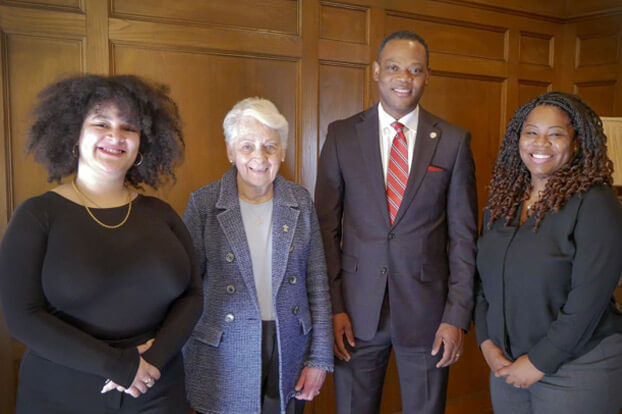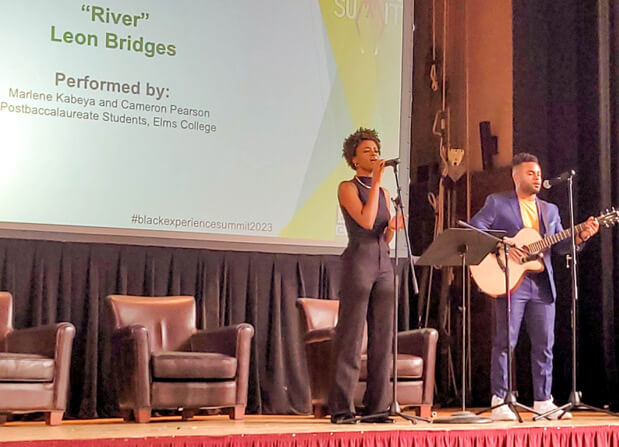Elms College closed out the month of February with a very successful staging of our 6th annual Black Experience Summit in Veritas Auditorium, as speakers and panelists explored the impact of racism in the life and history of religious institutions. It was an honor and a delight to be a part of the program.

Opening keynote speaker Shannen Dee Williams, associate professor of History at the University of Dayton, delivered a powerful narrative of the discrimination and misrepresentation suffered by Black catholic sisters within the U.S. Catholic Church.
In the closing keynote address, Olga Marnina Segura, a freelance writer and former opinion and culture editor at National Catholic Reporter, spoke thoughtfully of how contemporary movements like Black Lives Matter, which are often dismissed as too radical by the status quo, are consistent with the traditional social justice teachings of the religious faithful.
Elms visiting scholar Timothy Jones also moderated an interfaith discussion with panelists Mirza Yawar Baig of the Islamic Society of Western Massachusetts, Nina Diri of the Regional Baha’i Council of the Northeastern States, and The Reverend Marcus McCullough of Bethel African Methodist Episcopal (AME) Church in Springfield on the role places of worship play in combating racism and white supremacy

An event of this size and scope does not simply happen. There are a lot of people behind the scene involved with the planning and organizing of the many, many details that need to be locked in beforehand. On behalf of the Board of Trustees, faculty and staff, students and the many people in attendance, I wish to thank interim Chief Diversity Officer Dr. Jennifer Schoaff, the organizing committee, student volunteers, and my executive assistant Bevin Peters.
I also wish to thank Joshua Fernandez, and Marlene Kabeya and Cameron Pearson for their music and Devantae Butler for his spoken-word performances.
I thought I would share with you the brief introductory remarks I made to open the summit:
When we inaugurated the Black Experience Summit in 2018, I said then that it was needed more than ever. It is sad to say that this has become more true, not less, in 2023 than it was in 2018, if we consider any of the lessons on race relations learned during the pandemic years.
And so, Elms College is delighted to be able to offer this annual appointment to the Western Mass community– to examine topics affecting the experiences of African Americans and the African Diaspora in the United States from a variety of lenses. This year’s perspective is that of the Black Experience within faith communities under the theme of Embodying Faith, Seeking Racial Justice.
I have to admit that it is a bit daunting as the Black president of a predominantly white, Catholic institution of higher education to open a summit, which aims to explore, among other things, a history of racial discrimination within the Church. Well, I hope to do so by returning to the themes that have motivated us as a community all year: realism and optimism.
Implicit in the concept of realism is that of respect. Respect for the facts. Respect for the context in which those facts take place. And the humility to recognize that there is so much that I don’t know and that I need to learn.
A respect for the facts and the truth is indeed part of our primary function as a higher education institution, which functions in the Catholic intellectual tradition. In Ex Cordae Ecclesiae, Pope John Paul II wrote of a catholic college or university “as a place of research where scholars scrutinize reality… and so contribute to the treasury of human knowledge.” And we do that through an honest study of history, as stated by Connor Kelly, the Marquette professor of Catholic theological ethics. He wrote in a 2019 article in Journal of Catholic Higher Education, “The study of history allows for a deeper awareness of a people’s past, with all its tragedies, and imperfections.”
Respect for the context. The history of African Americans in the Church has to be contextualized within the history of African Americans in the United States. Some would contend that we all know the horrors associated with that history and that to constantly bring it up only leads to divisiveness. Quite the opposite, says Boston College Professor of Theology, James Keenan, SJ in his 2015 book University Ethics: How Colleges can build and benefit from a culture of ethics. “One of the great ethical problems on our campuses, the indwelling of racism, will never be overcome until there is a recognition of our racist history…[T]the American university is precisely the place in America that could provide hope to subdue the ghosts of racism and encounter solidarity with a reconciling spirit of accountability and forgiveness.”
Embedded within the very tragic history of African Americans in the United States is a no less painful history of Blacks within the Church. Boston College professor emerita and theologian, M. Shaun Copeland introduces the book Uncommon Faithfulness as follows: “Uncommon faithfulness: this phrase aptly and poignantly describes the black Catholic experience in the United States. Historians of American religion have unmasked the blemished record of the Catholic Church on slavery… Yet the spirit would not be quenched! For nearly 450 years on the North American continent, Catholics of African descent nurtured and maintained their faith and took courage and inspiration from it.”
Other Catholic theologians, like Fr. Brian Massingale, tell us that that history is not in the distant past, it continues to shape the experiences of African Americans in society at large and in communities of faith in particular.
There is so much we can learn if we pay attention to what these scholars and authors tell us. This is why I am grateful for the work of Shannen Dee Williams and Olga Segura. I learned much by reading their books about history past and contemporary. From Dr. Williams’ book, Subversive Habits: Black Catholic Nuns in the Long African American Freedom Struggle, I learned many interesting historical facts, including the intersection of the Haitian revolution and the establishment of black religious communities in Louisianna. From Olga Segura, I learned about the true origin of the Black Lives Matter movement and the role of Black women in its creation. I look forward to hearing both of their talks.
Realism tells us to respect the hard facts of history, no matter how uncomfortable. Optimism points us to the many reasons why, together, we can shape a different future.

I find the biggest sign of optimism in the fact that this year’s Summit has been co-sponsored by the Sisters of St. Joseph. You will hear directly from Sr. Betsy Sullivan, President of the Congregation of the Sisters of St. Joseph. But I also encourage you read this Sunday’s Springfield Republican in which she is quoted. Sr. Betsy talks about religious communities as needing to be “prophetic witnesses” to face the racial injustice of the past so we can ensure the dignity of all God’s people.” We are grateful to the Sisters of St. Joseph for co-sponsoring this summit and I am grateful to Sr. Carol Allan for introducing me to the work of Olga Segura.
My other source of optimism is in the many students who are here today. In his book Fight: How GenZ is channeling their fear and passion to save America, Harvard Institute of Politics John Della Volpe, who has been studying the attitudes of young people over decades, describes you as “the most diverse and most educated generation in history.” You, our students, ask us to be culturally responsive and you demand that we create an environment that is just for, and inclusive of, all people. Our mission as a higher education institution is to foster that vibrant and nurturing environment in which each of you can achieve your true potential. This starts by having summits like this one, in which we face the truth of our past, so that we can learn from it in order not to repeat it in our actions of today.
And this brings me to my third source of optimism — which stems from all the efforts that we are making at Elms College to be a just environment that aims to swim against the stream of practices that perpetuate subtle discrimination and biases. From our strategic plan to our organizational structure, from our Centers to our affinity groups, from our trustees to our students, our faculty, and our staff, we know that we have our imperfections. But together, we are committed to the ideal of seeing the dear neighbor in everyone, and having that perspective be the guide for our actions.
And so once again, thank you for being here this afternoon for the 6th Black Experience Summit. Even as we examine the truth of a difficult past, we remain united with optimism and, as Martin Luther King Jr. put it, “with an audacious faith in the future.”
Watch the video here